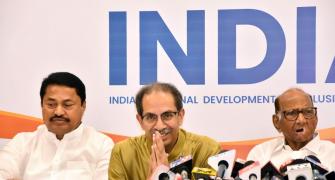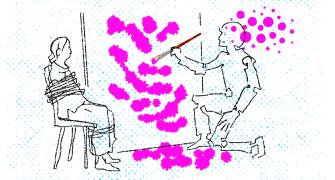As the controversy continues to rage regarding sex education in Indian schools, parents are increasingly finding that their children are sexually active. While some argue that youngsters apparently know more than they should about sex from a tender age and that sexual education will only encourage them to become sexually active, others are of the opinion that it is up to society to ensure their knowledge when it comes to contraceptives, pregnancy and sexual caution.
But like it or not, the fact remains that youngsters are indulging in sexual activities.
"While cleaning out my son's jeans pockets I found an empty packet of contraceptives. Chetan* is 17 years old and studies in one of the top colleges in Mumbai," says Maya Rajwati*, (42) a South Mumbaiite with two teenage children.
"I was clearing my son's suitcase and found a packet of contraceptives. Some had been used," says Sunita Chauhan*, (41), mother to 17-year-Amit*. Sunita, her husband and their 10-year-old daughter live in Durgapur; Amit is completing his undergraduate studies in a Delhi college.
"I chanced upon a text message on my daughter's mobile. It was from a boy and said "Last nite was gr8." The previous night she had been for a sleep-over to her best friend's house. When I confronted her about the SMS and asked what it meant, she was outraged that I was snooping!" says Meeta Rai*, mother to 17-year-old Anokhi*, who studies in Class XI of a Kolkata school.
These aren't the storylines of some novel or film -- they are a reality. Indian teens today are having consensual sex and their parents are left haplessly wondering how to address and tackle the situation.
While Sunita lost her temper and engaged in a heated argument with her son on how he could indulge in such "immoral acts", Maya adopted quite a different approach. She said, "I was shocked, devastated and dumbfounded. I wanted to go to the next room and slap my son, but held back. I let a couple of days pass (with great difficulty) and kept thinking of how to address the issue. I realised that irrespective of what I said to my son he would continue to do as he pleased. I chose to become his confidante and friend instead of sermonising him about the traditional values that I grew up with. For the youth of today, such values are non-existent. It was very difficult for me to accept my son's point of view, but I did it."
Maya sat with her son and spoke openly, talking frankly about the dangers of infection, AIDS and pregnancy. She adds, "I told my son that he should act responsibly. He shouldn't get any girl in trouble and neither should he ever indulge in sex without adequate protection. I also told him that the union of two persons should be special; sex should take place between two people who are serious about each other. I tried to imbibe in him that he shouldn't indulge in random and indiscriminate sex."
Maya's son, Chetan, was equally taken back. He had expected his mother to "freak out", in teenage parlance. "She was so cool and composed. She explained a lot of things to me and today we are the best of friends. I can talk to her about anything and everything. I realise how difficult it is for her to accept my life the way it is and I love her more for not sermonising," he says.
Sunita, on the other hand, had an ugly showdown with her son Amit. She tried to tell him how boys from good families don't indulge in random sex with women and how it is not part of Indian culture to have sex before marriage -- but none of it (as expected) made any sense to the teenager. As a result, Amit stopped going home on vacation. Says he, "My parents don't realise that I belong to a different generation, which has a different set of values. My mother gets emotional and gives me long lectures which I find extremely irritating. So instead of going home every holiday and facing the interrogation squad, I take up summer jobs to earn extra money and gain experience." And yes, needless to say he carries on with his lifestyle as he deems fit, his mom's raving and ranting notwithstanding.
When Meeta questioned Anokhi about the message on her mobile, she was outraged that her mother was snooping and invading her privacy. "I just couldn't get her to see my point of view, that I was concerned about her safety and well being. I couldn't imagine that my 17-year-old was indulging in physical relations. I have gone wrong somewhere! I wonder what I did wrong for my daughter to commit such shameful acts!" cries Meeta in despair. The situation came to a flashpoint when to curb Anokhi, Meeta stopped her from stepping out of the house, except to go to school. She wasn't allowed to go anywhere. This made Anokhi more adamant, rebellious and headstrong. She told her parents, "Do what you want. In one year I'll turn 18 -- then I'll move out of your house and be on my own and live my life my way."
This is the grim reality today. While teenagers want to live life their way, parents face the dilemma of accepting and tackling the issue of their children's sexual relations. Maya is truly an exception, as most parents wouldn't accept and deal with the situation the way she did. Parental discomfort in this area is plain to see.
There was a unanimous uproar when schools wanted to introduce sex education as a subject in school. Buckling under pressure from irate mothers and fathers, the school authorities have now decided to classify the birds and bees jargon under the less controversial label of 'health education'. Parents seem to believe that their children "aren't the type who would need this kind of information". Most of them wear blinders and don't want to accept the fact that teenage sex is a reality -- that their teenagers are indulging in consensual sex.
But it's a fact. However hard it may be for parents to accept. And the teenagers need to be educated and informed about protection, possible infections and grave illnesses they can contract. In their obvious discomfort at accepting changing times, parents are willy-nilly leaving their children in the dark to find their own answers, sometimes the hard way. The end result may be more damaging and dangerous -- would you rather educate your child about AIDs, or prefer to assume that he/ she doesnt indulge in sex and doesn't need such knowledge, only to discover that he/ she has indeed been indulging in unprotected sex with multiple partners? The time has come for the veil of traditional values to be removed and the need of the hour addressed.
There are just a handful of parents who are able to handle the situation like Maya. "This was bound to happen. We like Western music, movies, food habits and now the lifestyle. It was just a matter of time and I'm not surprised that our teenagers are thinking and living the way the West does," says Maya. She has a few words of advice for parents of teenagers:
~ Don't make the mistake of sermonising and telling your kids that sex is immoral. This sounds ludicrous to them and reaffirms to them that you can't understand their lives.
~ Try to be a friend. Explain to them the risks of unprotected sex. Your kids should know that you trust them and that they can approach you in case of any trouble. If you antagonise and isolate them, in times of trouble they will cut you off and try to solve problems themselves. This could be dangerous.
~ Accept that the world is a different place today than it was when you were in high school and college.
Says Maya, "I'm not worried about my son getting some girl pregnant. I'm more worried about him contracting AIDS. I don't want him to make a mistake and pay with his life for it."
Meeta and her husband had to be counselled that their approach with Anokhi was wrong. It was distancing her from them and she would have left home after turning 18 and done something rash only to spite her parents. Meeta says, "A close friend, who is also a student counsellor, sat us down and explained that we would have to gain Anokhi's trust. If she walked out of the house after turning 18, legally we wouldn't be able to stop her. She could get into trouble. Today we are trying to accept the fact that our daughter does have sex. It has been very difficult for both my husband and me -- we hail from very traditional and conservative Bengali family. But I'm trying to understand Anokhi. I accompany her to sessions with the counsellor and collectively we try to educate her about the dangers and the absolute importance of using protection. And yes, I promised never to read her messages again and she in turn promised to always tell me where she is going. While I have kept my promise, Anokhi doesn't go for any more sleepovers."
While many parents may scoff at Maya and say that what she's doing is wrong, the question is -- do parents have much of a choice? In such a scenario, isn't it better to be a friend to your children rather than a hostile parent? Only if you are a friend will your children come to you when in trouble. Surely you don't want them seeking help from outside.
Try to set aside your own moral values and put yourself in your children's shoes -- this may sound difficult or even impossible to you, but do it anyway. Nobody said parenthood would be easy!







